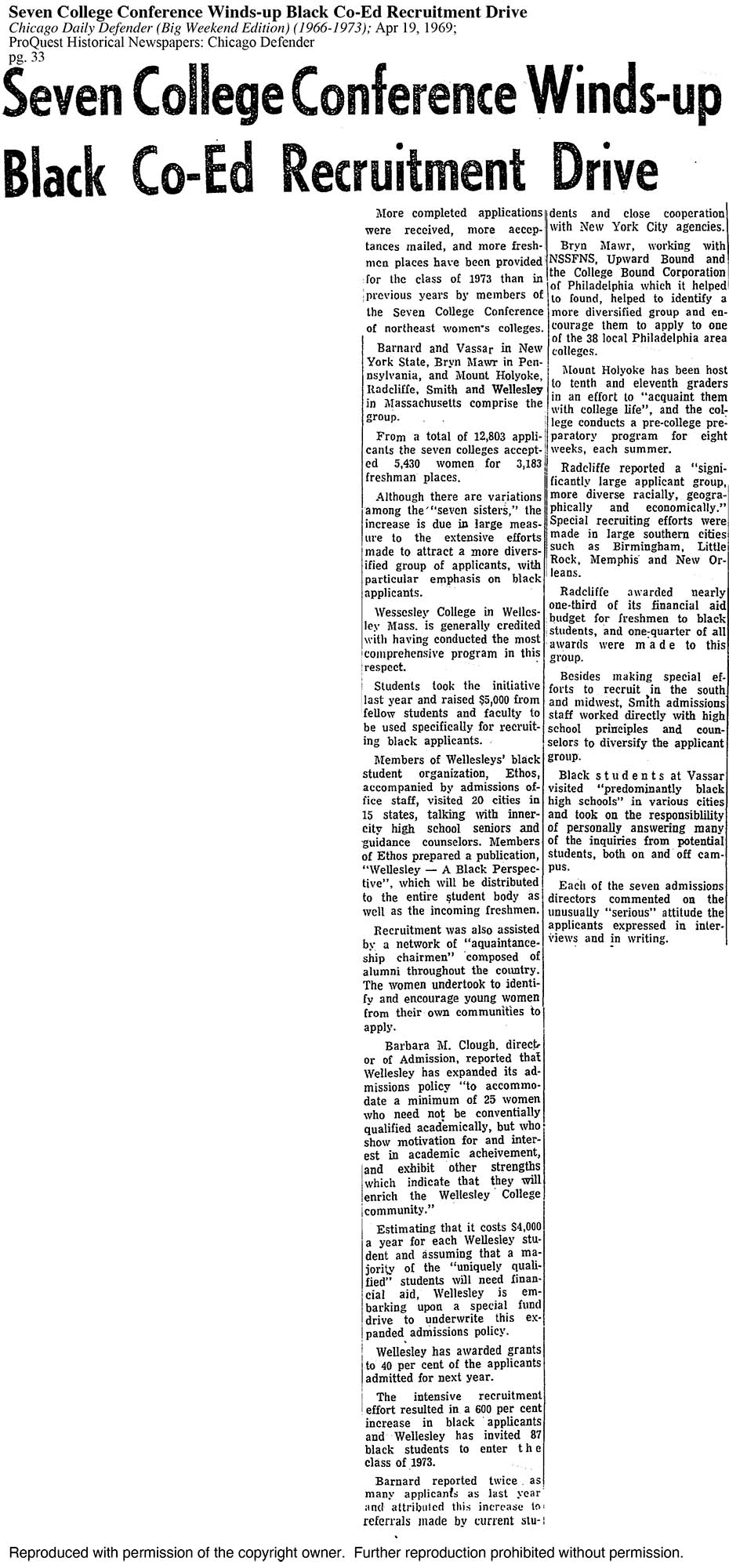This final article highlights the Seven Sisters’ work to increase diversity on their campuses. It is described here that Black Vassar students were working hard to increase the number of Black applicants to Vassar. The Black Vassar students visited predominantly Black high schools to recruit students and answer questions. While this should not have been the responsibility of Black students, their effort to promote Vassar does show that they found value in attending the institution.

Full Article
Seven College Conference Winds-up Black Co-Ed Recruitment Drive
Chicago Daily Defender (Big Weekend Edition) (1966-1973);
Apr 19, 1969;
ProQuest Historical Newspapers: Chicago Defender
pg. 33
More completed applications were received, more acceptances mailed, and more freshmen places have been provided for the class of 1973 than in previous years by members of the Seven College Conference of northeast women’s colleges.
Barnard and Vassar in New York State, Byrn Mawr in Pennsylvania, and Mount Holyoke, Radcliffe, Smith and Wellesley in Massachusetts comprise the group.
From a total of 12,803 applicants the seven colleges accepted 5,430 women for 3,183 freshman places.
Although there are variations among the “seven sisters,” the increase is due in large measure to the extensive efforts made to attract a more diversified group of applicants, with particular emphasis on black applicants.
Wellesley College in Wellesley Mass. Is generally credited with having conducted the most comprehensive program in this respect.
Students took the initiative last year and raised $5,000 from fellow students and faculty to be used specifically for recruiting black applicants.
Members of Wellesleys’ black student organization, Ethos, accompanied by admissions office staff, visited 20 cities in 15 states, talking with inner-city high school seniors and guidance counselors. Members of Ethos prepared a publication, “Wellesley—A Black Perspective”, which will be distributed to the entire student body as well as the incoming freshmen.
Recruitment was also assisted by a network of “acquaintanceship chairmen” composed of alumni throughout the country. The women undertook to identify and encourage young women from their own communities to apply.
Barbara M. Clough, director of Admission, reported that Wellesley has expanded its admissions policy “to accommodate a minimum of 25 women who need not be conventionally
qualified academically, but who show motivation for and interest in academic achievement, and exhibit other strengths which indicate that they will enrich the Wellesley College community.”
Estimating that it costs $4000 a year for each Wellesley student and assuming that a majority of the “uniquely qualified” students will need financial aid, Wellesley is embarking upon a special fund drive to underwrite this expanded admissions policy.
Wellesley has awarded grants to percent of the applicants admitted for next year.
The intensive recruitment effort resulted in a 600 percent increase in black applicants and Wellesley has invited 87 black students to enter the class of 1973.
Barnard reported twice as many applicants as last year and attributed this increase to referrals made by current students and close cooperation with New York City agencies.
Bryn Mawr, working with NSSFNS, Upward Bound and the College Bound Corporation of Philadelphia which it helped to found, helped to identify a more diversified group and encourage them to apply to one of the 38 local Philadelphia area colleges.
Mount Holyoke has been host to tenth and eleventh graders in an effort to “acquaint them with college life”, and the college conducts a pre-college preparatory program for eight weeks, each summer.
Radcliffe reported a “significantly large applicant group, more diverse racially, geographically and economically.” Special recruiting efforts were made in large southern cities such as Birmingham, Little Rock, Memphis and New Orleans.
Radcliffe awarded nearly one-third of its financial aid budget for freshmen to black students, and one-quarter of all awards were made to this group.
Besides making special efforts to recruit in the south and Midwest, Smith admissions staff worked directly with high school principles and counselors to diversify the applicant group.
Black students at Vassar visited “predominantly black high schools” in various cities and took on the responsibility of personally answering many of the inquiries from potential students, both on and off campus.
Each of the seven admissions directors commented on the unusually “serious” attitude the applicants expressed in interviews and in writing.
Seven College Conference Winds-up Black Co-Ed Recruitment Drive original article (PDF, 78KB)
Reproduced with permission of the copyright owner. Further reproduction prohibited without permission.

